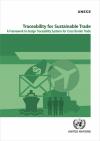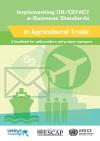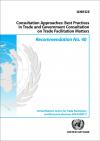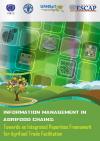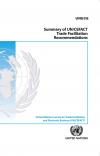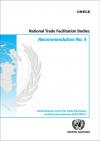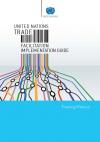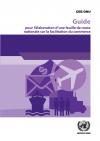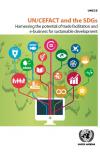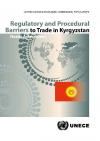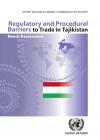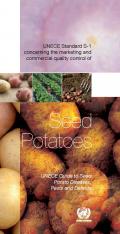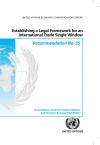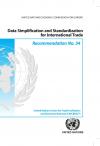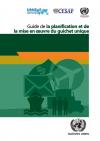Publications
Displaying Results 61 - 80 of 124
- English
Consumers and producers are increasingly interested in knowing how products are made and whether there are any adverse environmental or social impacts. While two products may look or feel similar, consumers may still distinguish between them on the basis of certain intangible policy claims, such as whether they are “organic” or “sustainably produced”. Since these types of claims are difficult
- English
This Handbook presents a general framework for the design of of e-Business projects in the agrifood sector using open, international standards. It specifically looks at four e-Business standards developed by UN/CEFACT in the areas of:Electronic phytosanitary certificates; Electronic reporting of sustainable fishery management; Electronic exchange of laboratory
- English
Persimmons - Explanatory Brochure (ECE/TRADE/417)
The Explanatory Brochure on the Standard for Persimmons (ECE/TRADE/417) has been developed to harmonize the interpretation of the Standard, thereby facilitating international as well as national trade. It addresses producers and traders, as well as inspection authorities. It
- English
The purpose of Recommendation N°. 40 (ECE/TRADE/423) is to inform government agencies and private sector stakeholders about approaches to effective consultations that will be flexible, transparent, fair, accountable, and participatory. This Recommendation addresses issues such as
- English
International trade in agricultural and food products is more complex than trade in manufacturing – trade regulations are stricter, paperwork is more cumbersome and logistics are more complex. These elements are mainly required for ensuring food safety for consumers. Detailed information on traded goods alongside the movement of goods in a supply chain is critically
- English
This publication (ECE/TRADE/346/Rev.1) contains the latest information on trade facilitation recommendations established under the auspices of the United Nations Centre for Trade Facilitation and Electronic Business (UN/CEFACT). The publication provides a summary of the approved
- English
This Recommendation, first published in 1974, has been revised in light of the changing context for Trade Facilitation and the adoption of the Trade Facilitation Agreement of the World Trade Organization. The revised Recommendation suggests that governments establish national trade facilitation bodies (NTFB) as an indispensable component of trade policy formation
- English
Trade facilitation creates a reliable, fast and cost-effective trade environment that benefits all countries and businesses, especially small and medium-sized enterprises (SMEs). It’s a collaborative effort by governments and traders to cut the costs of doing trade, reduce delays at borders, and make public agencies dealing with trade more efficient.Multiple
- English
In recent years, trade facilitation (TF) has been recognised as a key factor in trade and economic development policy. This is due to the realisation that trade facilitation can generate major benefits for the economy in terms of competitiveness and efficiency and can greatly enhance the participation of developing and transition economies in the global economy.
- English
The activities carried out by UN/CEFACT have very significant effects on the world we live in. They not only have specific impacts related to trade and e-business cutting across a broad range of domains, they also play a significant role in efforts to achieve even the most overarching goals such as poverty eradication and the reduction of inequality within and between
- English
Since 2010 the UNECE has been undertaking studies of regulatory and procedural barriers to trade in selected UNECE member countries with economies in transition, with a view to: assisting countries in their efforts to achieve greater regional and global economic integration; informing donors as to where assistance might be required; and, strengthening policy
- English
The continuous reductions in tariff and non-tariff barriers to trade and the rise of global supply chains have further increased the importance of trade as an engine of growth, creating new opportunities for investments, job creation and human development. However, for several countries, capitalising on these opportunities is
- Pусский
Сертификация семенного картофеля представляет собой процесс обеспечения качества семенного картофеля, реализуемого на рынке. Обычно сертификация проводится на национальном уровне согласно установленным стандартам. Посадка здорового семенного картофеля является одним из ключевых факторов увеличения производства пригодного для потребления и переработки картофеля.
В стандарте Европейской
- Français
La certification des plants de pomme de terre est l’aboutissement d’un processus de contrôle visant à garantir la qualité des plants commercialisés; elle est en principe réalisée selon des normes règlementaires nationales. Utiliser des plants sains est un facteur déterminant pour porter à son maximum la production de pommes de terre susceptibles d’être consommées ou transformées.
La norme pour
- English
Seed potato certification is the process of assuring the quality of seed potatoes being marketed, usually done nationally according to regulated standards. Planting healthy seed potatoes is a key factor in maximizing the production of usable potatoes for consumption or processing.
The United Nations Economic Commission for Europe (UNECE) Standard for Seed Potatoes sets out a common terminology
- English
UN/CEFACT Recommendation 35: Establishing a Legal Framework for an International Trade Single Window The publication (ECE/TRADE/401) of Recommendation 35 adds to the suite of products offered by UNECE to assist with the establishment of a Single Window. There
- English
UN/CEFACT Recommendation 34: Data Simplification and Standardization for International TradeRecommendation Number 34 (ECE/TRADE/400) was developed in response to a particular set of requests from Single Window implementers who were faced with the task of harmonizing and standardizing government information
- English
Assessing regulatory and procedural measures in trade: An Evaluation Methodology (ECE/TRADE/409) ......The Committee on Trade (CT) is a multilateral platform that brings representatives of governments from the 56 member States of the United Nations Economic Commission for Europe (UNECE) together with civil society organizations
- English
Commercial quality standards for agricultural produce are developed and approved by the United Nations Economic Commission for Europe through its Working Party on Agricultural Quality Standards. These international standards facilitate trade, encourage high-quality production, improve profitability and protect consumer interests. They are used by governments, producers, traders, importers and
- English
...The Single Window Planning and Implementation Guide contains managerial guidelines for policy managers, policymakers and those who are tasked to plan and manage the information technology-enabled Single Window development projects for simplifying cross-border trade procedures and document requirements within


